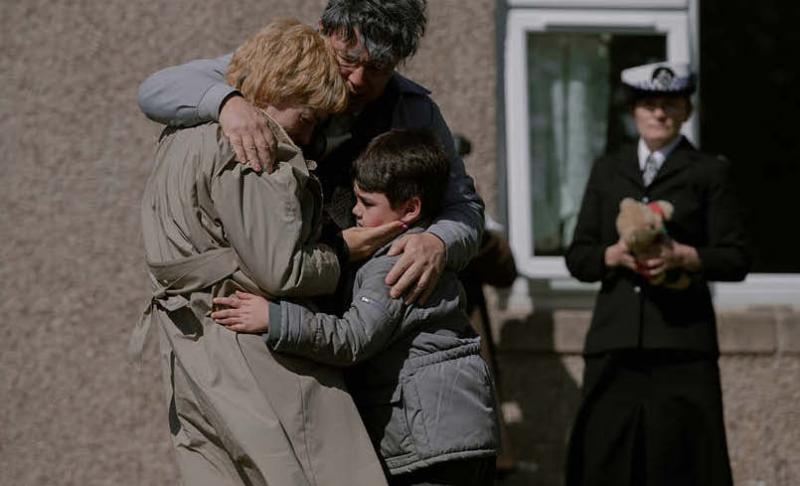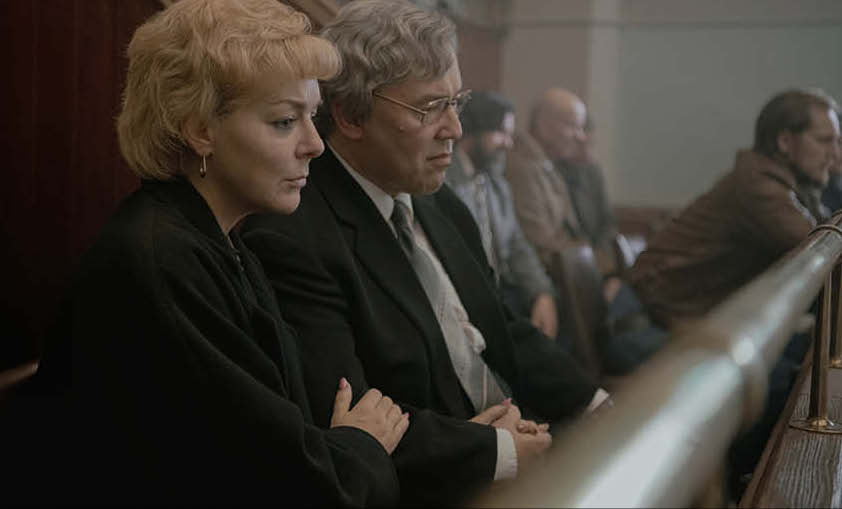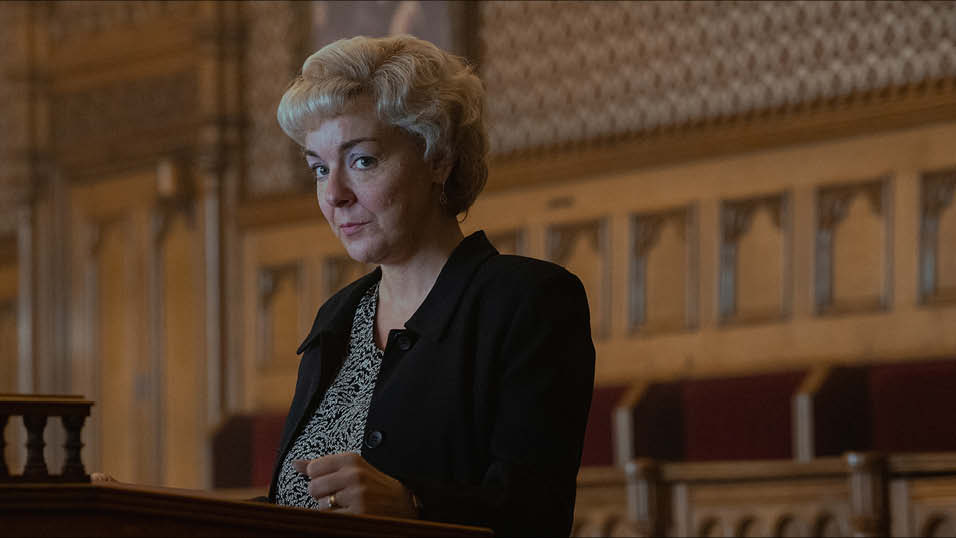I Fought the Law, ITVX review - how an 800-year-old law was challenged and changed | reviews, news & interviews
I Fought the Law, ITVX review - how an 800-year-old law was challenged and changed
I Fought the Law, ITVX review - how an 800-year-old law was challenged and changed
Sheridan Smith's raw performance dominates ITV's new docudrama about injustice

ITV continues its passion for docudramas about injustice, which you can’t blame it for after the rip-roaring success of Mr Bates vs the Post Office. The issue in I Fought the Law is, from one angle, of national (even International) importance, though compared to the persecution of hundreds of innocent postmasters, some of whom committed suicide, its cause is a rarer bird.
The person fighting the law is Ann Ming (Sheridan Smith), a feisty mother from Billingham, near Middlesbrough, whose daughter Julie, her oldest child, goes missing in 1989. It takes over two months for her body to be discovered in her bathroom – found by Ann MIng herself, who had been sure from the first day her daughter didn’t check in with her that something was badly wrong. But she couldn’t persuade the police to start looking for 22-year-old Julie for another five days. They even searched Julie's house, to no avail. Vital forensic clues were lost because of the delay in finding the corpse, a factor in the failure of two juries to reach a majority verdict. So the accused walked free.
The issue here, which is referenced in the first five minutes, is whether Mrs Ming can persuade the country’s lawmakers to overturn a centuries-old statute that is preventing her family from getting proper justice for Julie. Her murderer is later caught boasting about getting away with the crime, confident that the double jeopardy rule means he can't be retried for the same offence. We first see Ann at the House of Lords in 2003, where she has gone to address a select committee that is considering reversing this ancient statute.
 The four episodes that follow flash back 14 years and painstakingly recreate Julie’s disappearance, the police inquiries, the courtroom scenes and the trials’ aftermath, during which the Ann's marriage to Charlie (Daniel York Loh, pictured left with Smith) falters and her campaign inevitably has to surmount the usual obstacles faced by tough, lippy women who refuse to back down. She first gains the ear of her MP, Frank Cook (Ron Cook), then proceeds to petition Home Secretary Jack Straw, the Law Commission, the CPS, the Lords, anyone in authority who will grant her an audience.
The four episodes that follow flash back 14 years and painstakingly recreate Julie’s disappearance, the police inquiries, the courtroom scenes and the trials’ aftermath, during which the Ann's marriage to Charlie (Daniel York Loh, pictured left with Smith) falters and her campaign inevitably has to surmount the usual obstacles faced by tough, lippy women who refuse to back down. She first gains the ear of her MP, Frank Cook (Ron Cook), then proceeds to petition Home Secretary Jack Straw, the Law Commission, the CPS, the Lords, anyone in authority who will grant her an audience.
As usual, Smith gives a standout performance that's painful to watch at times as a woman half-crazed with grief and fury at the treatment of her beloved daughter, by the police as well as by the man who killed her. She played a similar mother, whose gay son was murdered, in Four Lives and also a campaigning neighbour of Shannon Matthews, the girl who “vanished”, in The Moorside. The key cast is exemplary, an impressive array of character actors. And also as usual, the series’ artistic director has excelled in creating authentic period stylings, from the cars and appliances to the gas fires and perms.
But, a heretical thought, might not the issues raised in Ann Ming’s 2008 book about her fight for justice, For the Love of Julie, have been better served as a two-hour documentary? (Ming, now 79 and still living in the northeast, was a consultant on the series and appears in the final scene) The problem with the docudrama format is that it inevitably directs the viewer’s attention to its production values – to the quality of the acting, the script, the art direction, even the incidental music and the props. That means the televised show itself isn't just delivering information but can come between the subject and its audience. True, a documentary is mediated too, by its director and editor in particular. But at least in a documentary, those involved in the story can be allowed to speak on camera for themselves.
A documentary could have given more airtime to analysing the suspect, Billy Dunlop (Jack James Ryan), a man Julie knew, and to how he was ensnared while jailed for perjury, heard boasting about doing the murder. (He was reportedly then trapped by a prison officer wearing a wire, which we don't see.) The script, though, sticks resolutely to depicting the Mings, and hardly any screen time doesn’t feature Ann. There is no big mystery to be uncovered in the final reel about the circumstances of the murder, or about how her campaign fared, as both the case and its impact on the Mings were much publicised at the time and are accessible via Ming’s book. The focus is on the couple's state of mind as the wheels of justice grind slowly on. It's only in the final episode that you see something of their earlier backstory as victims of racist neighbours who objected to part-Chinese Charlie living among them -- a chilling scene that establishes Ann's high-octane capacity for defending her family. A more clinical account of this case and its impact might also have diluted some of the stereotypes this drama is peopled with: the dismissive or inadequate detectives, the smoothy toff barrister, the crusty peers. The latter -- "mostly old white men, and conservative", as Lord Goldsmith, the attorney general (Rufus Jones), portrays them to Ming before the meeting -- yawn and check their watches when Ming begins to talk to them about her PTSD since finding Julie’s body, then suddenly, with strings swelling, start nodding along to her increasingly impassioned speech and, instead of barking at her to speak up, shout “Hear, hear!”
A more clinical account of this case and its impact might also have diluted some of the stereotypes this drama is peopled with: the dismissive or inadequate detectives, the smoothy toff barrister, the crusty peers. The latter -- "mostly old white men, and conservative", as Lord Goldsmith, the attorney general (Rufus Jones), portrays them to Ming before the meeting -- yawn and check their watches when Ming begins to talk to them about her PTSD since finding Julie’s body, then suddenly, with strings swelling, start nodding along to her increasingly impassioned speech and, instead of barking at her to speak up, shout “Hear, hear!”
How compelling it would have been to have one of the peers present that day describe that committee meeting and its impact on them personally. I would also have liked fuller scrutiny of double jeopardy than the short televised spat we see between Ming and the lawyer Imran Khan, who was vehemently against reversing the law for fear it would lead to sloppier policing. What Ming achieved was stupendous, but there were sound reasons, as well as less sound ones, why double jeopardy was retained all those centuries, not least its use as a deterrent to powerful states, wealthy organisations and thwarted autocrats who were unhappy with the legal result they got first time round and could then persecute their enemies anew.
This granular detail isn't offered, and neither are the precise terms of the bill Ming helped get through, under which a second trial after an acquittal can take place. Understandably, Jamie Crichton's script is keen to place Ming's emotional speeches at its centre, and hats off to Sheridan Smith for her performance of them, but the script's broad-brush approach isn't always a positive.
- All four episodes of I Fought the Law are available on ITVX
- More television reviews on theartsdesk
The future of Arts Journalism
You can stop theartsdesk.com closing!
We urgently need financing to survive. Our fundraising drive has thus far raised £49,000 but we need to reach £100,000 or we will be forced to close. Please contribute here: https://gofund.me/c3f6033d
And if you can forward this information to anyone who might assist, we’d be grateful.

Subscribe to theartsdesk.com
Thank you for continuing to read our work on theartsdesk.com. For unlimited access to every article in its entirety, including our archive of more than 15,000 pieces, we're asking for £5 per month or £40 per year. We feel it's a very good deal, and hope you do too.
To take a subscription now simply click here.
And if you're looking for that extra gift for a friend or family member, why not treat them to a theartsdesk.com gift subscription?
more TV
 I Fought the Law, ITVX review - how an 800-year-old law was challenged and changed
Sheridan Smith's raw performance dominates ITV's new docudrama about injustice
I Fought the Law, ITVX review - how an 800-year-old law was challenged and changed
Sheridan Smith's raw performance dominates ITV's new docudrama about injustice
 The Paper, Sky Max review - a spinoff of the US Office worth waiting 20 years for
Perfectly judged recycling of the original's key elements, with a star turn at its heart
The Paper, Sky Max review - a spinoff of the US Office worth waiting 20 years for
Perfectly judged recycling of the original's key elements, with a star turn at its heart
 The Guest, BBC One review - be careful what you wish for
A terrific Eve Myles stars in addictive Welsh mystery
The Guest, BBC One review - be careful what you wish for
A terrific Eve Myles stars in addictive Welsh mystery
 theartsdesk Q&A: Suranne Jones on 'Hostage', power pants and politics
The star and producer talks about taking on the role of Prime Minister, wearing high heels and living in the public eye
theartsdesk Q&A: Suranne Jones on 'Hostage', power pants and politics
The star and producer talks about taking on the role of Prime Minister, wearing high heels and living in the public eye
 King & Conqueror, BBC One review - not many kicks in 1066
Turgid medieval drama leaves viewers in the dark
King & Conqueror, BBC One review - not many kicks in 1066
Turgid medieval drama leaves viewers in the dark
 Hostage, Netflix review - entente not-too-cordiale
Suranne Jones and Julie Delpy cross swords in confused political drama
Hostage, Netflix review - entente not-too-cordiale
Suranne Jones and Julie Delpy cross swords in confused political drama
 In Flight, Channel 4 review - drugs, thugs and Bulgarian gangsters
Katherine Kelly's flight attendant is battling a sea of troubles
In Flight, Channel 4 review - drugs, thugs and Bulgarian gangsters
Katherine Kelly's flight attendant is battling a sea of troubles
 Alien: Earth, Disney+ review - was this interstellar journey really necessary?
Noah Hawley's lavish sci-fi series brings Ridley Scott's monster back home
Alien: Earth, Disney+ review - was this interstellar journey really necessary?
Noah Hawley's lavish sci-fi series brings Ridley Scott's monster back home
 The Count of Monte Cristo, U&Drama review - silly telly for the silly season
Umpteenth incarnation of the Alexandre Dumas novel is no better than it should be
The Count of Monte Cristo, U&Drama review - silly telly for the silly season
Umpteenth incarnation of the Alexandre Dumas novel is no better than it should be
 The Narrow Road to the Deep North, BBC One review - love, death and hell on the Burma railway
Richard Flanagan's prize-winning novel becomes a gruelling TV series
The Narrow Road to the Deep North, BBC One review - love, death and hell on the Burma railway
Richard Flanagan's prize-winning novel becomes a gruelling TV series
 The Waterfront, Netflix review - fish, drugs and rock'n'roll
Kevin Williamson's Carolinas crime saga makes addictive viewing
The Waterfront, Netflix review - fish, drugs and rock'n'roll
Kevin Williamson's Carolinas crime saga makes addictive viewing
 theartsdesk Q&A: writer and actor Mark Gatiss on 'Bookish'
The multi-talented performer ponders storytelling, crime and retiring to run a bookshop
theartsdesk Q&A: writer and actor Mark Gatiss on 'Bookish'
The multi-talented performer ponders storytelling, crime and retiring to run a bookshop

Add comment